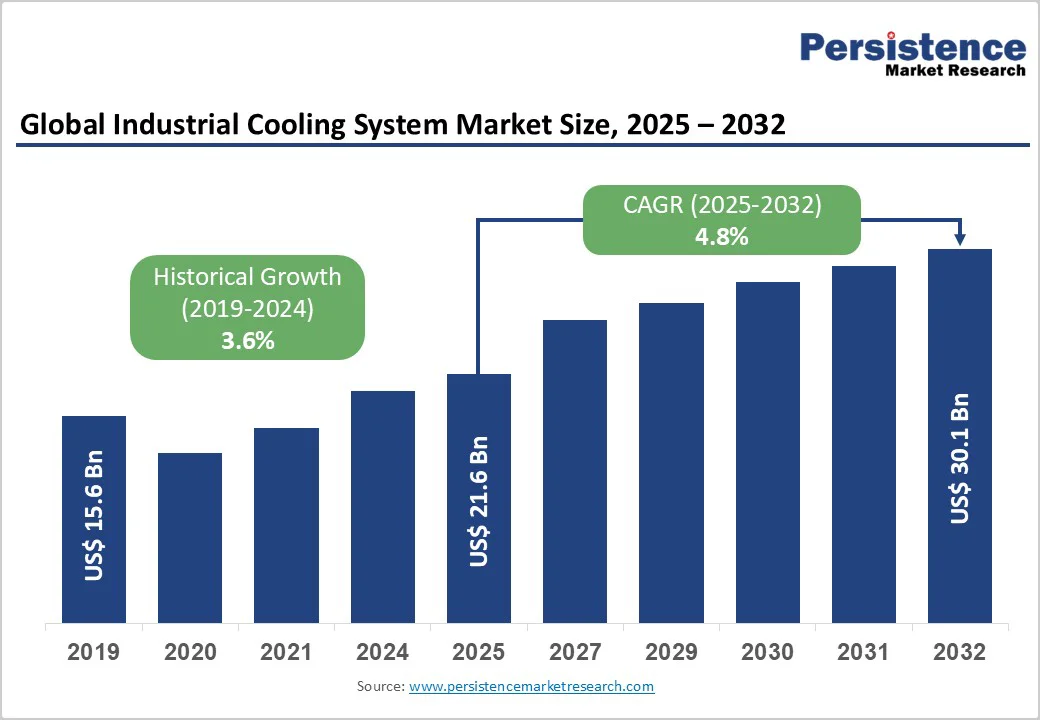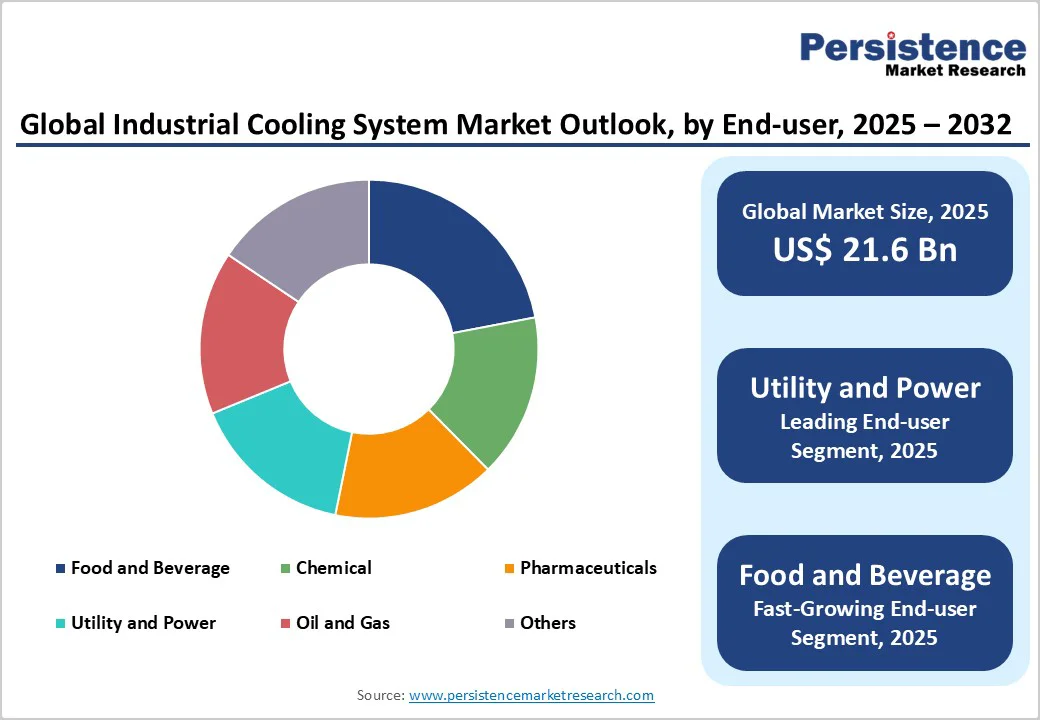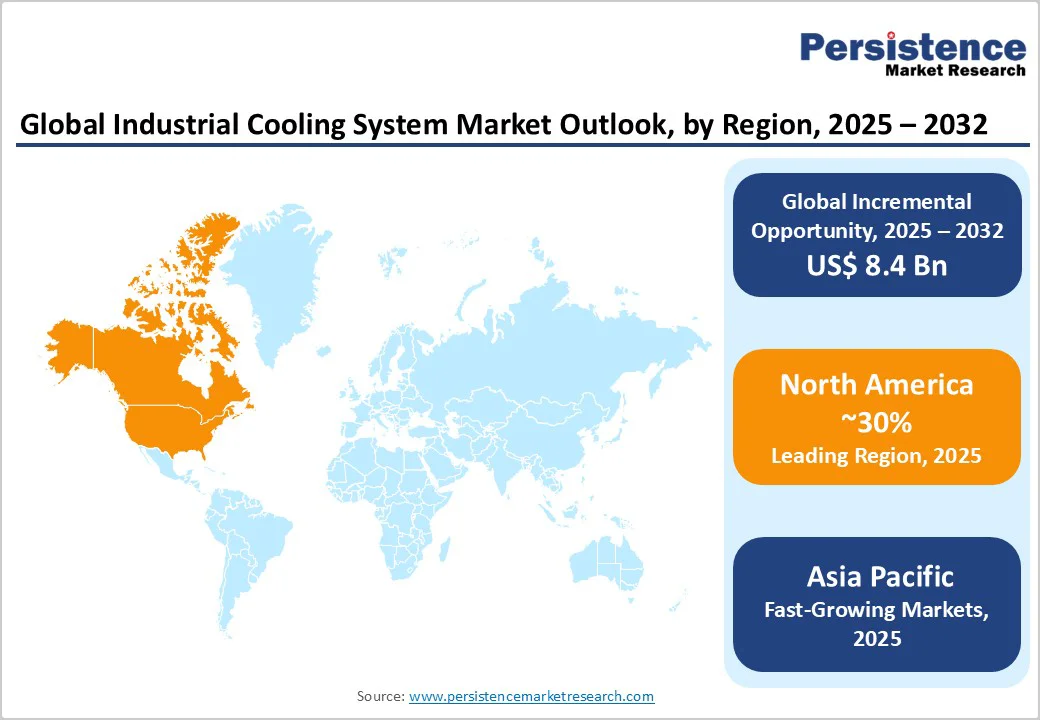ID: PMRREP33564| 189 Pages | 7 Nov 2025 | Format: PDF, Excel, PPT* | Industrial Automation

The global industrial cooling system market size is likely to be valued at US$ 21.6 billion in 2025, and is projected to reach US$ 30.1 billion by 2032, growing at a CAGR of 4.8% during the forecast period 2025-2032. This growth is driven by rapid industrial expansion, fueled particularly by sectors such as manufacturing, power generation, pharmaceuticals, and data centers, which increasingly require efficient thermal management solutions.
Rising environmental concerns and stringent government regulations are accelerating the adoption of energy-efficient, eco-friendly cooling technologies including hybrid and evaporative systems. Innovations such as AI-enabled cooling optimization, hybrid systems, and low-GWP refrigerants are shaping future market dynamics, while the surge in digital infrastructure and cloud computing demand is propelling data center cooling as one of the fastest-growing segments within this market.
| Key Insights | Details |
|---|---|
|
Industrial Cooling System Market Size (2025E) |
US$ 21.6 Bn |
|
Projected Market Value (2032F) |
US$ 30.1 Bn |
|
Global Market Growth Rate (CAGR 2025 to 2032) |
4.8% |
|
Historical Market Growth Rate (CAGR 2019 to 2024) |
3.6% |

The industrial cooling system market is experiencing significant growth due to a heightening need for environmentally sustainable and energy-efficient cooling solutions. As awareness of the environmental impact of industrial activities increases and concerns about climate change intensify, industries around the world are transferring their attention to greener and more sustainable practices. The ongoing paradigm shift is having a significant impact on the industrial refrigeration sector, compelling manufacturers to develop innovative systems that comply with rigorous environmental regulations while also ensuring optimal performance.
In the light of increasing scrutiny from governmental and regulatory entities regarding energy consumption and emissions, industries are obliged to explore cooling alternatives that are in line with sustainability objectives. Increased demand has been observed for industrial cooling systems that utilize environmentally benign refrigerants, prioritize energy efficiency, and integrate cutting-edge technologies such as evaporative cooling because of the pressing need to mitigate carbon emissions. Manufacturers are, therefore, progressively allocating resources towards research and development to produce state-of-the-art systems that not only ensure the prompt cooling of industrial processes but also make a positive contribution towards the overarching objectives of environmental preservation.
The industrial cooling system market growth is currently being constrained by the escalating expenses linked to cutting-edge cooling technologies. With the growing awareness among industries regarding the necessity of implementing advanced and energy-efficient cooling systems, the initial capital outlay associated with these technologies emerges as a substantial barrier. The incorporation of cutting-edge attributes, environmentally sustainable refrigerants, and intelligent functionalities results in an increase in the overall expenditure of industrial refrigeration systems.
One significant factor influencing the industrial cooling system market is the fluctuating cost of critical components and raw materials utilized in the production of these systems. The susceptibility of the market to supply chain disruptions, geopolitical events, and fluctuations in global commodity markets presents a substantial obstacle for participants in the industry. Uncertainty of this nature has the potential to cause abrupt and unforeseeable increases in production expenses, thereby impacting the overall profitability and competitive standing of firms engaged in industrial refrigeration.
The market for industrial cooling systems stands to benefit from the positive impact of the expanding implementation of smart technologies and digitalization in industrial processes. The emergence of Industry 4.0, and the Internet of Things (IoT) has provided the industrial refrigeration sector with novel opportunities for advancement. Intelligent industrial cooling systems provide continuous monitoring and regulation of temperature and energy consumption through the utilization of sensors and data analytics functionalities.
By optimizing cooling processes, this technological integration not only improves operational efficiency but also facilitates predictive maintenance, which in turn decreases equipment outages and extends its lifespan. There is a growing recognition among industries of the potential of intelligent cooling solutions to address their present requirements and ensure the sustainability of their operations in the digital age. The integration of digital technologies into industrial refrigeration systems facilitates proactive decision-making and optimizes the allocation of resources.
The water-cooling segment is expected to dominate the market in 2025 with a revenue share exceeding 39%, driven by its extensive use in high-load industrial applications requiring efficient heat dissipation. Industries such as power generation, petrochemicals, and manufacturing favor water-cooled systems for their superior heat transfer efficiency and ability to manage large thermal loads with compact setups. The availability of water resources and established industrial infrastructure further support segment growth.
Meanwhile, the hybrid cooling segment is projected to record the highest CAGR of approximately 9% from 2025 to 2032, fueled by the widespread demand for energy-efficient and eco-friendly systems. Combining wet and dry cooling advantages, hybrid systems offer operational flexibility based on environmental and cost factors, making them ideal for data centers, pharmaceuticals, and electronics manufacturing.
The utility & power sector is poised to lead in 2025, accounting for the largest industrial cooling system market revenue share, on account of the high demand for cooling systems in power generation and utility operations. Thermal, nuclear, and combined-cycle plants rely heavily on efficient cooling to maintain performance, prevent overheating, and ensure operational safety. Rising global electricity demand, modernization of aging infrastructure, and stricter environmental regulations are driving investments in advanced cooling technologies.
The pharmaceutical segment, on the other hand, is projected to record the highest CAGR between 2025 and 2032, driven by the pressing need for precise temperature control in manufacturing, storage, and transport of temperature-sensitive products such as vaccines and biologics. Expanding biotechnology activities and growing pharmaceutical production in emerging markets are further fueling the demand for high-performance, energy-efficient cooling solutions.

With the highest potential share, the North American region is positioned to dominate the industrial cooling system market in 2025. The region's pre-eminence is a result of several factors, including a firmly established industrial infrastructure, widespread implementation of cutting-edge technologies, and rigorous regulatory measures that encourage energy conservation and environmental sustainability.
Industrial cooling systems are in high demand in North America, specifically in the U.S., where investments are prioritized in state-of-the-art cooling solutions with the aim of improving operational efficiency. Furthermore, the substantial market share of North America and strong emphasis on technological advancements by stakeholders in the region are factors that are contributing to its prominence in the international market.
The Europe industrial cooling systems market is projected to grow at over 6% CAGR from 2025 to 2032, driven by stringent environmental regulations and rising demand for sustainable, energy-efficient solutions. Efforts to reduce carbon footprints are pushing industries toward technologies that minimize energy use and emissions. Industrial modernization and digitalization across manufacturing, power generation, and data centers further support market expansion. In the U.K., growth is fueled by the nation’s 2050 net-zero targets, boosting the adoption of eco-friendly cooling in manufacturing, data centers, and food sectors. Government focus on green energy and low-carbon innovation continues to shape market advancement.
In Asia Pacific, the industrial cooling system market is projected to grow at an estimated 8% CAGR during the 2025-2032 period, driven by rapid industrialization, massive urbanization, and rising demand for energy-efficient solutions. Advanced cooling towers and heat exchangers are increasingly adopted to minimize energy use, supported by stringent environmental regulations and sustainability initiatives. Expanding manufacturing and power generation industries in India, South Korea, and Southeast Asia further boost market growth.
In Japan, strong emphasis on carbon reduction and energy efficiency, particularly in semiconductor, automotive, and power sectors, is accelerating adoption of advanced, eco-friendly industrial cooling technologies.

Prominent entities in the global industrial cooling system market, including Johnson Controls, Trane Technologies, and Carrier Corporation, maintain and augment their market presence through the implementation of strategic initiatives. An essential element of their methodology entails the perpetual pursuit of innovation and technological progress.
These corporations are known to make substantial investments in R&D to maintain a leading position in the field of refrigeration technology. They establish themselves as frontrunners in addressing the changing demands of industries through the creation of state-of-the-art systems that prioritize environmental sustainability, energy efficiency, and operational optimization.
The global industrial cooling system market is projected to reach US$ 21.6 billion in 2025.
The key market driver is the growing need for energy-efficient and sustainable cooling solutions across industries such as power generation, manufacturing, data centers, and pharmaceuticals.
The market is poised to witness a CAGR of 4.8% from 2025 to 2032.
Innovating AI-enabled cooling optimization, hybrid systems, and low-GWP refrigerants, tapping into the on-going surge in digital infrastructure and cloud computing demand, and meeting the enormous cooling requirements for data centers are key market opportunities.
Some of the key market players include Johnson Controls International plc, Daikin Industries, Ltd., Trane Technologies plc, and Carrier Global Corporation.
|
Report Attributes |
Details |
|
Historical Data/Actuals |
2019 - 2024 |
|
Forecast Period |
2025 - 2032 |
|
Market Analysis Units |
Value: US$ Bn/Mn, Volume: As Applicable |
|
Geographical Coverage |
|
|
Segmental Coverage |
|
|
Competitive Analysis |
|
|
Report Highlights |
|
By Product
By Function
By End-Use Industry
By Region
Delivery Timelines
For more information on this report and its delivery timelines please get in touch with our sales team.
About Author